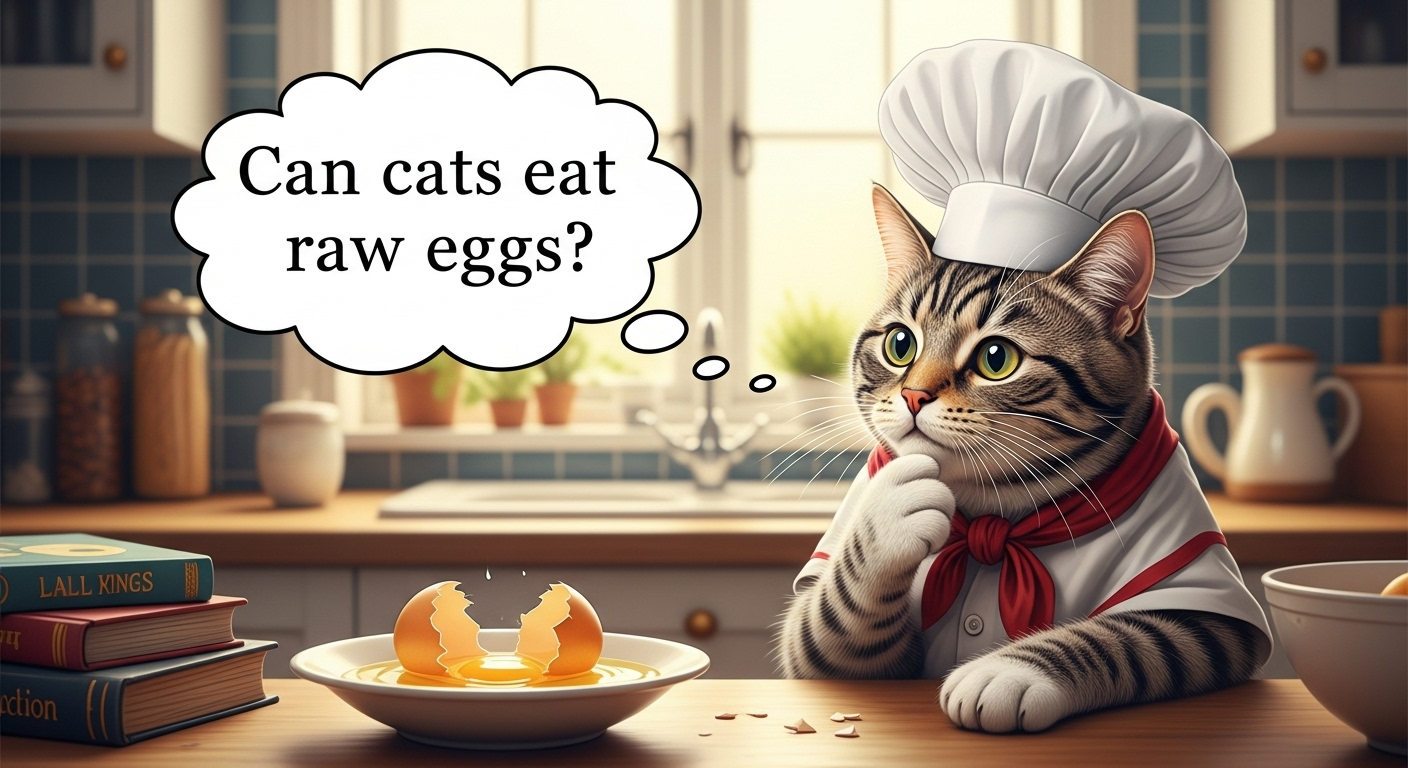Can cats eat raw eggs? Yes, they can — but veterinarians and pet nutritionists strongly recommend that they shouldn’t. Raw eggs may look like a natural, protein-rich food, but for cats they carry more risks than rewards. From harmful bacteria like Salmonella to nutrient absorption issues caused by raw egg whites, feeding raw eggs can do more harm than good.
The twist? Once cooked, eggs become a safe, digestible, and nutrient-packed treat for cats. So why is the same food dangerous raw but healthy when cooked? Let’s dig into the science and find out.
Why Cats Shouldn’t Eat Raw Eggs
At first glance, raw eggs might seem like a perfect fit for a cat’s carnivorous diet. They’re animal-based, protein-dense, and easy to find. But beneath the shell lies a set of risks that make raw eggs unsuitable for feline diets.
1. Risk of Bacterial Infection
Raw eggs can harbor bacteria such as Salmonella and E. coli, which cause gastrointestinal upset in cats.
- Symptoms include: vomiting, diarrhea, fever, loss of appetite, and lethargy.
- Cats with weaker immune systems — kittens, elderly cats, or those with chronic illnesses — face the highest risk.
- In severe cases, untreated bacterial infections can become life-threatening.
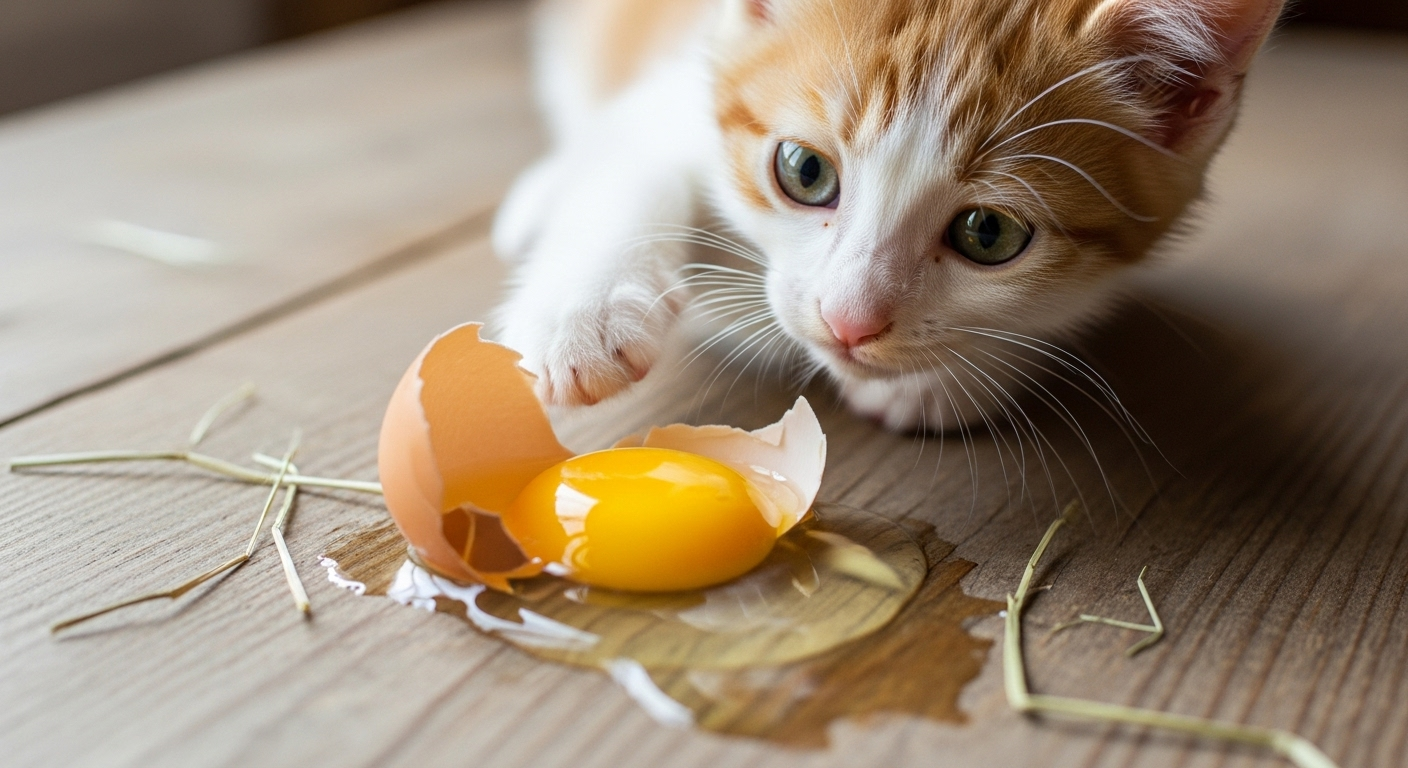
2. Biotin Deficiency from Avidin
Raw egg whites contain avidin, a protein that binds to biotin (Vitamin B7) and prevents it from being absorbed. Biotin is critical for:
- Maintaining healthy skin
- Supporting a shiny coat
- Aiding proper metabolism
Without enough biotin, cats may develop hair loss, flaky skin, or digestive issues. While egg yolks contain biotin, they can’t fully balance the effect of avidin in raw whites.
3. Poor Digestibility
Raw egg whites are only about 50% digestible, while cooking increases digestibility to nearly 90%. This means that even if raw eggs didn’t contain bacteria, your cat wouldn’t get full nutritional benefit from them.
You may also like: Can Cats Eat Raw Chicken? A Complete Guide to Benefits, Risks, and Safe Feeding Tips
The Nutritional Value of Eggs (When Cooked)
Eggs are often called a “superfood” — and for good reason. They’re packed with protein, amino acids, vitamins, and minerals that cats can use to thrive. The key is making sure they’re cooked.
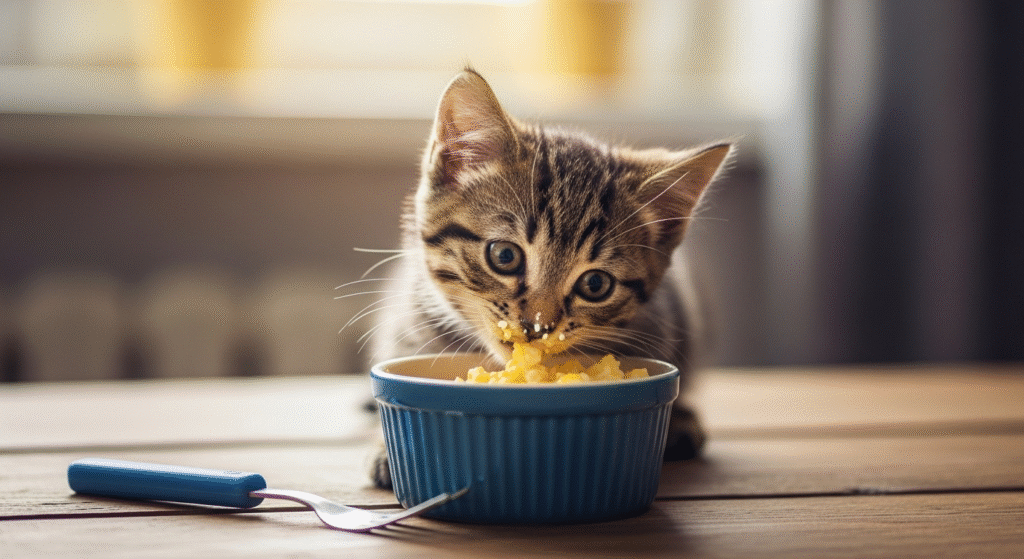
Cooked eggs provide:
- Protein: One large egg contains about 6 grams, supporting muscle maintenance and energy.
- Amino acids: Cats need 11 essential amino acids, and eggs provide 10 of them.
- Healthy fats: Omega-3 and Omega-6 fatty acids benefit heart, brain, and skin health.
- Vitamins: A, D, E, and B-complex vitamins support immunity, bone strength, and digestion.
- Minerals: Iron promotes red blood cell production, selenium helps prevent cell damage, and zinc contributes to coat health.
That’s why some breeders add eggs to feline diets for shinier coats and stronger claws, and why many cat food brands include eggs in their formulas.
What If Your Cat Eats a Raw Egg by Accident?
Sometimes accidents happen — maybe you drop an egg in the kitchen and your cat licks it up before you can clean. Should you be worried?
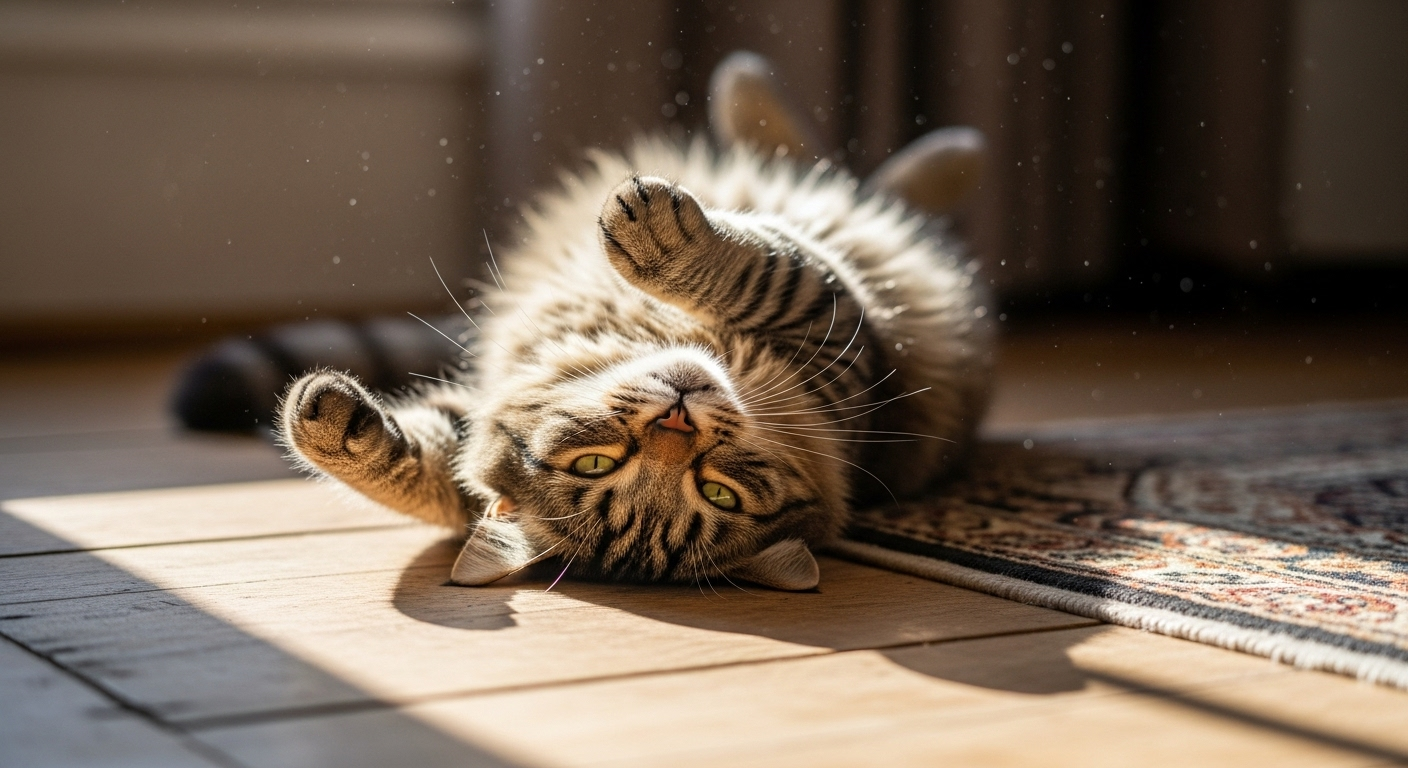
- A small taste: A lick or two may not cause immediate harm, but monitor your cat for signs of stomach upset.
- A larger portion: Eating a whole raw egg significantly raises the risk. Watch for vomiting, diarrhea, fever, or loss of appetite, and call your veterinarian if symptoms appear.
- Prevention tip: Clean up any raw egg spills quickly to protect both your cat and your household from bacteria.
How to Safely Prepare Eggs for Cats
If you want your cat to enjoy the nutritional benefits of eggs, the key is cooking them properly. Cooking eliminates harmful bacteria and neutralizes avidin, making eggs both safe and highly digestible.
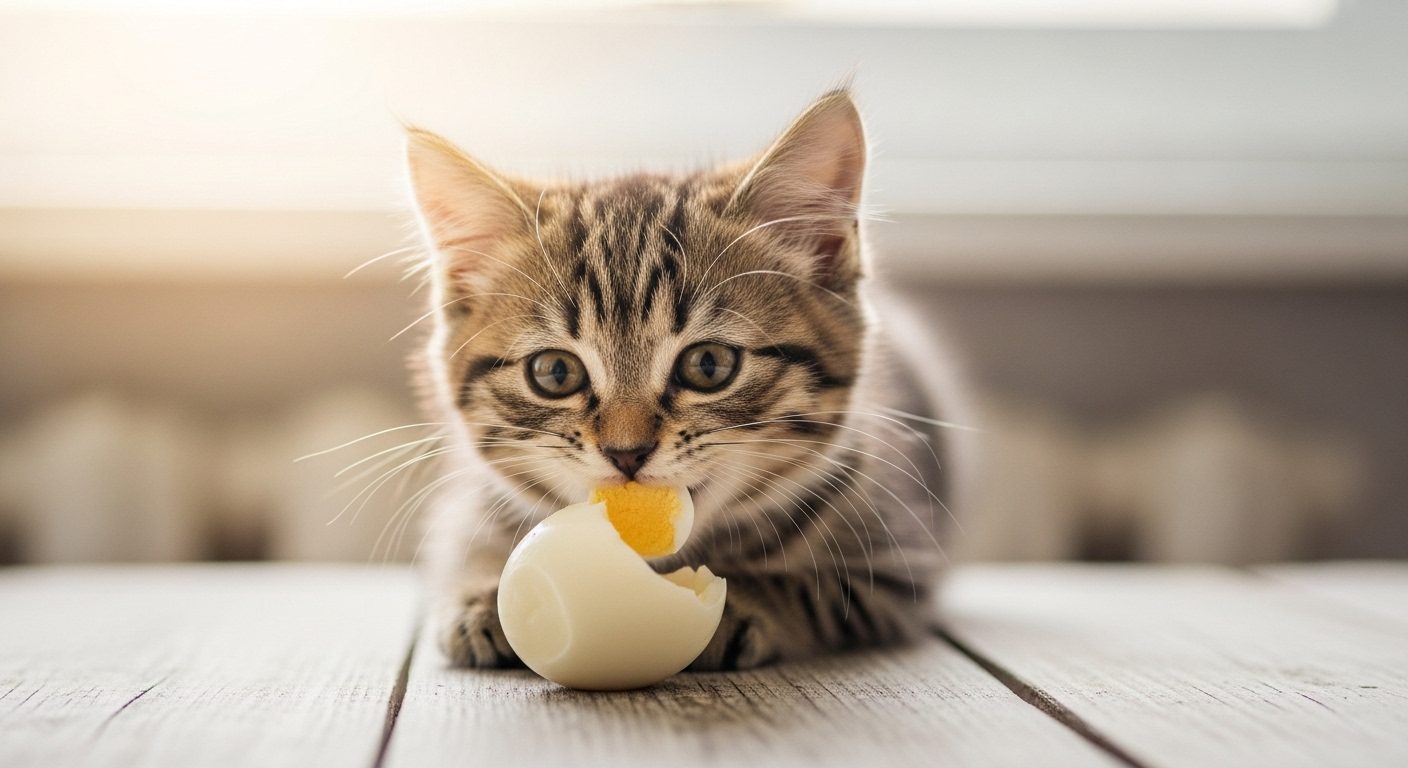
Here are the safest ways to prepare eggs for your cat:
- Boiled Eggs: Simple and effective. Just boil the egg, peel the shell, and chop the egg into small, bite-sized pieces.
- Scrambled Eggs: A favorite among many cats. Cook in a non-stick pan without oil, butter, or seasoning. Scrambled eggs are soft and easy to digest.
- Poached Eggs: Another healthy option, as long as the egg is fully cooked.
- Fried Eggs: Technically possible, but not recommended. Cooking with oils, butter, or sprays adds unnecessary fat and calories.
🚫 Avoid additives. No salt, pepper, milk, cheese, or herbs. What may taste great to you can upset your cat’s stomach or even be toxic.
How Much Egg Can a Cat Eat?
Even though eggs are nutrient-rich, they should be treated as a snack, not a staple. Cats need a complete, balanced diet that includes other essential nutrients, not just protein from eggs.
- Calorie guidelines:
- An average 10-pound cat requires about 200–250 calories per day.
- One large egg contains roughly 70 calories.
- That means a whole egg is far too much for a single serving.
- Safe serving size:
- A few small bites, or about one teaspoon of cooked egg, is enough for most cats.
- Eggs should make up less than 10% of daily calories.
- Frequency:
- Once or twice a week is plenty.
- Feeding eggs daily can unbalance your cat’s diet and lead to weight gain.
💡 Pro tip: Start with a small amount and increase slowly, watching how your cat reacts. Some cats may love eggs right away, while others may ignore them.
Can Kittens Eat Eggs?
Yes, kittens can eat eggs — but it’s not usually recommended. Here’s why:
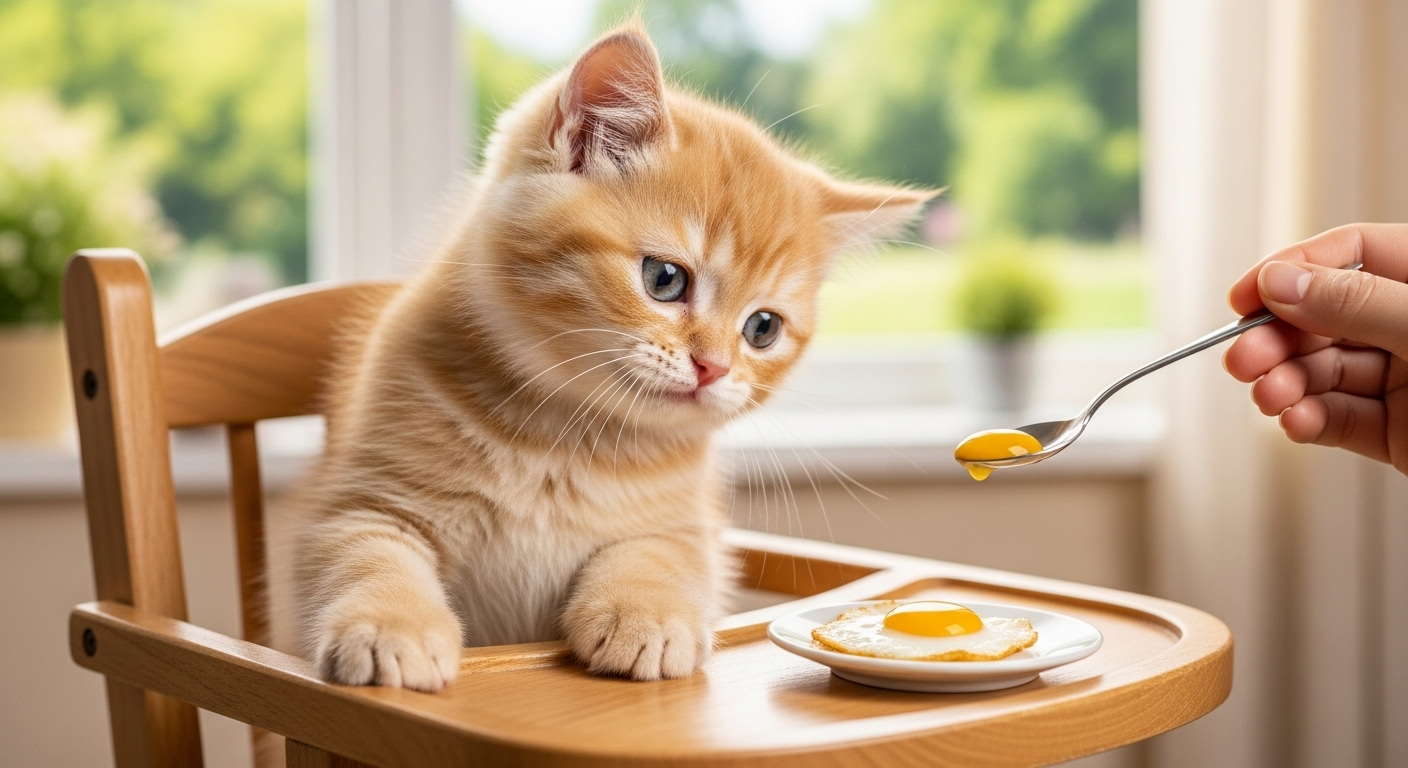
- Nutritional needs: Kittens require precise amounts of protein, fat, vitamins, and minerals for proper growth. Their diets should come primarily from specially formulated kitten food.
- Small calorie budgets: Because kittens eat less overall, adding eggs could quickly fill them up and displace essential nutrients.
- Occasional treat only: If you do offer egg, keep the portion tiny — just a few crumbs of cooked egg mixed with their regular food.
For long-term kitten health, it’s best to stick with veterinarian-approved kitten diets rather than relying on human foods.
Are Eggshells Good for Cats?
Surprisingly, yes — eggshells can be beneficial when prepared correctly. They are rich in calcium, which supports strong bones and teeth. But there are important rules to follow:
- Never feed raw eggshells. They can carry bacteria and also pose a choking hazard.
- Boil first. Cooking kills bacteria and makes the shell safer.
- Grind into powder. Crushing or grinding the shell into a fine powder makes it easy to mix into your cat’s food.
- Tiny amounts only. Cats need calcium, but too much can cause urinary or bone issues.
👉 Many commercial cat foods already contain balanced calcium sources. Eggshell powder should only be considered as a supplement if recommended by your veterinarian.
The Benefits of Cooked Eggs in a Cat’s Diet
When fed responsibly, cooked eggs can provide a variety of benefits:
- Shinier, softer coats thanks to amino acids and healthy fats.
- Stronger muscles and more energy from high-quality protein.
- Healthier skin and immune support from vitamins and minerals.
That said, remember: eggs alone are not a complete meal. They’re best used as a reward, enrichment snack, or occasional supplement to your cat’s regular food.
The Risks of Feeding Too Many Eggs
Even though cooked eggs can be healthy, it’s possible to give your cat too much of a good thing. Overfeeding eggs may lead to several problems:
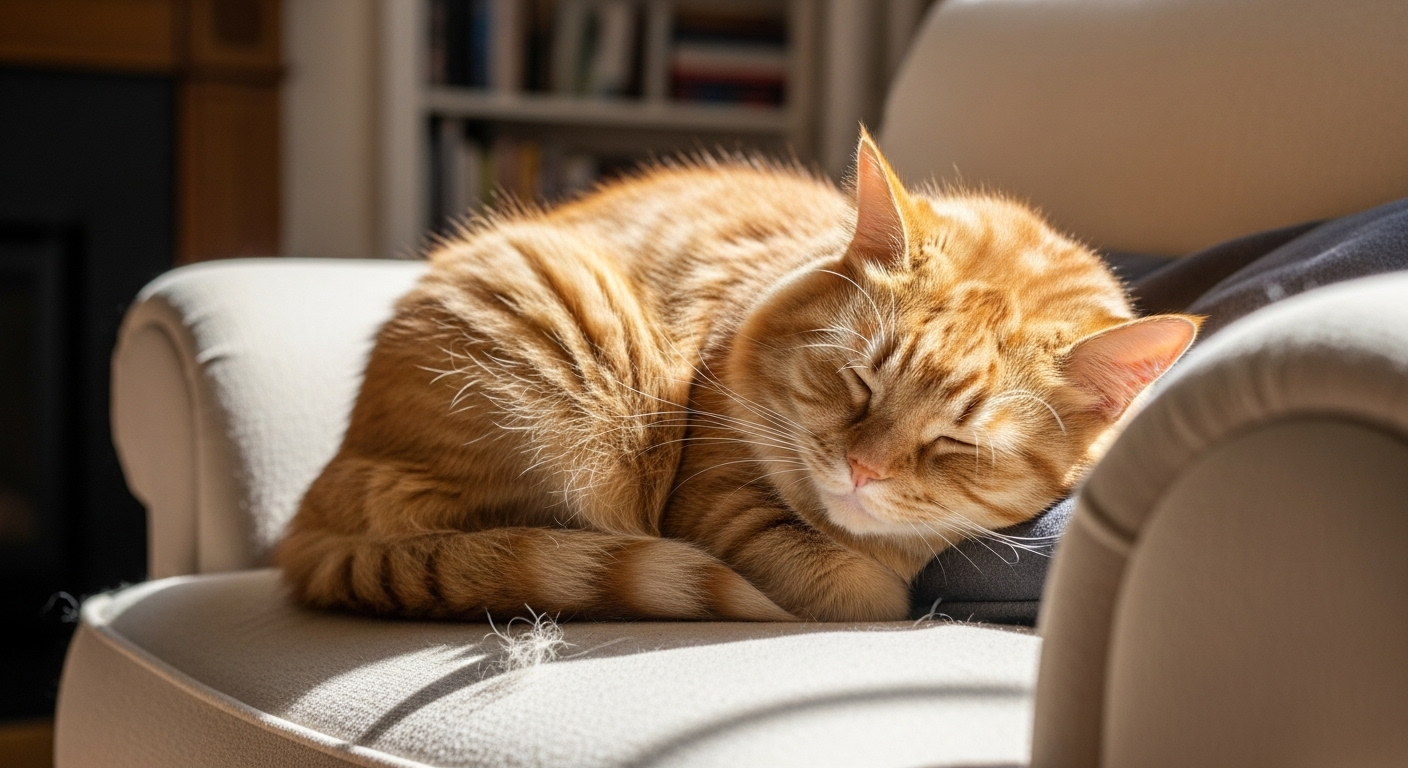
- Obesity and Weight Gain
- Eggs are calorie-dense. Too many can push your cat over their daily limit, leading to weight gain.
- Obesity in cats increases the risk of diabetes, joint problems, and heart disease.
- Pancreatitis
- Egg yolks are rich in fat and cholesterol. Feeding them too often can trigger inflammation of the pancreas, especially in cats already prone to digestive issues.
- Nutritional Imbalance
- While eggs provide protein and certain vitamins, they don’t have all the nutrients cats need.
- Cats require taurine, arachidonic acid, and other nutrients found in a complete cat food diet. Too many eggs could crowd out those essentials.
Signs Your Cat May Not Tolerate Eggs
Most cats can enjoy small amounts of cooked eggs without trouble, but some may experience intolerance or even allergies. Watch out for these signs after feeding eggs:
- Vomiting or diarrhea
- Excessive scratching or licking
- Sneezing or watery eyes
- Skin irritation, rashes, or hair loss
- Ear infections
⚠️ If you notice any of these symptoms, stop feeding eggs and consult your veterinarian. Egg allergies are uncommon in cats but still possible.
FAQs
Yes, technically they can, but they shouldn’t. Raw eggs carry bacteria like Salmonella and proteins that block nutrient absorption. Cooked eggs are the safe choice.
Yes, but only when cooked and in moderation. Egg yolks are rich in fat and cholesterol, so they should be a rare treat — not a regular part of the diet.
Cooked egg whites are safe, high in protein, and low in fat. Raw whites, however, contain avidin, which blocks biotin absorption.
Once or twice a week is plenty. Eggs should make up no more than 10% of your cat’s daily calories.
Yes, but only when boiled and ground into powder. Eggshells are high in calcium and can support bone health, but too much may cause problems.
Kittens can have small amounts of cooked egg, but it’s not necessary. Their diets should be based on kitten-formulated food for proper growth.

